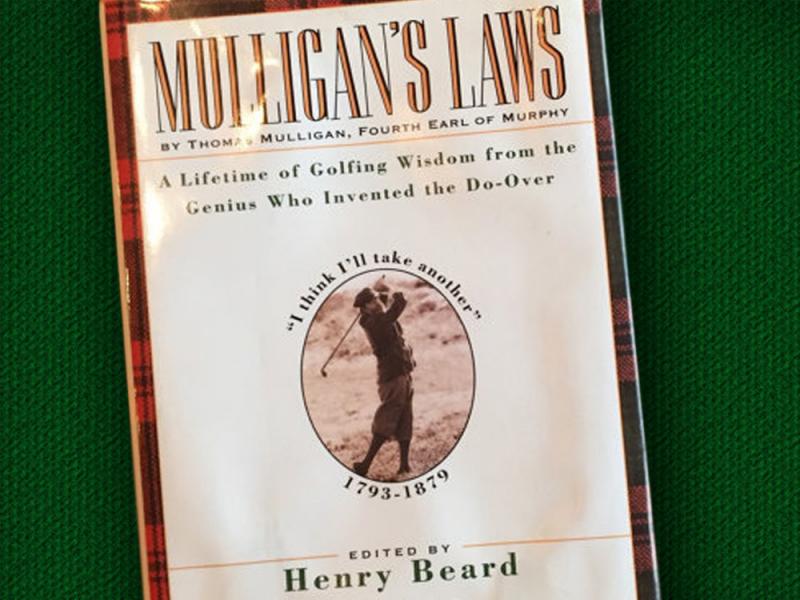Every golfer, amateur or pro, has heard of the golf term Mulligan. Under oath, we all would have to admit to at least once using a Mulligan in a friendly golf outing. Case in point, you arrive at your favorite course with 15 minutes to check in, load your bag and drive to the first tee.
The starter is checking his watch and marking your names off on his clipboard as you tee up your drive. If you were lucky, you were able to swing your driver a couple of times before launching your ball 40 yards with a duck hook or shank. Now, a good friend standing behind you will often say, “take a Mulligan,” which then begins to give the starter a slow burn, because he knows the entire foursome will often need a Mulligan. He has a schedule to keep and there is no golfer named Mulligan listed on his clipboard.
Where did the term originate? Was it named after a real person, or was it a cute name for the longer term, “why don’t you take a do-over?” Golfing minds want to know. A thorough search online revealed the term may have originated in the early 1800s from the Scottish slang, “maul- it- again.” This seemed like a plausible answer, until I recently discovered a dusty old book in an antique bookshop entitled “Mulligan’s Laws” (by who else but Thomas Mulligan, Fourth Earl of Murphy). Mulligan, who lived to the ripe old age of 86 (1793-1879), not only invented the Mulligan, but also added his own laws of the game which infuriated the Scottish purists of the time. After his death on April 1, 1879, the original manuscript of his book was found in his golf locker, hidden away by his long time caddie who saved his wisdom for the ages. (He later sold it for big bucks to a London publisher, since Mulligan rarely tipped.) So now, 140 years later, I will share with you the wit and wisdom of a man who loved to hate the game of golf.
The game: “The game of golf is 90% mental and 10% mental, but remember, if your driver is hot, your putter will be cold; if you hit crisp iron shots, you will top your woods and if you right elbow tucked in, your head will fly up.” He goes on to say, “the secret of golf is to hit your Mulligan first and use your real swing to take a big divot.”
Scoring: “Strokes always accumulate faster than they can be forgotten and since bad shots come in groups of three; a fourth bad shot is the beginning of the next group of three.” Here was a golfer who had a firm grip on reality. My personal favorite about scoring is: “The score a player reports on any hole should always be considered as his opening offer. Another pearl of wisdom is: “The only way to find a drive sliced deep into the woods is to hit a provisional ball 260 yards down the middle.”
The foursome: “Don’t play with anyone who will question a seven” and remember, “The less skilled the player is, the more likely he is to share his ideas about the golf swing.”
Golf etiquette: He actually has numerous tips listed, but his top two were: “Always replace your divots in the fairway and rake footprints in the sand trap, even if you have to move your ball.” And, “Remember it only takes a few extra seconds to pick up a club left on the green by the group of slower players in front of you and throw it deep into the woods.”
Playing the game: “Nonchalant putts count the same as chalant putts.” “The wind will always be in your face on 16 of the 18 holes”, and “The ball will always land on the green where the pin was yesterday.”
Was Thomas Mulligan a real person? I personally hope so, but do we really know for sure? Or is he another elusive mystery like the Loch Ness monster or Bigfoot? There was however, one law in his book with which the golf purists of Scotland agreed: “The most difficult shot in golf is a perfect lie in the fairway, 150 yards from the pin!”
19th Hole trivia
Golf shoes with cleats were invented by the Scots in 1857 and were “roughed with small nails or sprigs.”
Alan Shepard hit two range balls on the moon marked with Property of Jack Harden, his golf pro at Houston’s River Oaks Country Club. One six iron shot went close to a mile.
In 1935, Sam Parks won the U.S. Open with two putters in his bag. One was for lag putts, while the other was used to hole out short putts.
Golfing legend Sam Snead was the only player to have the number “0” imprinted on his tournament golf balls for identification purposes.




















































